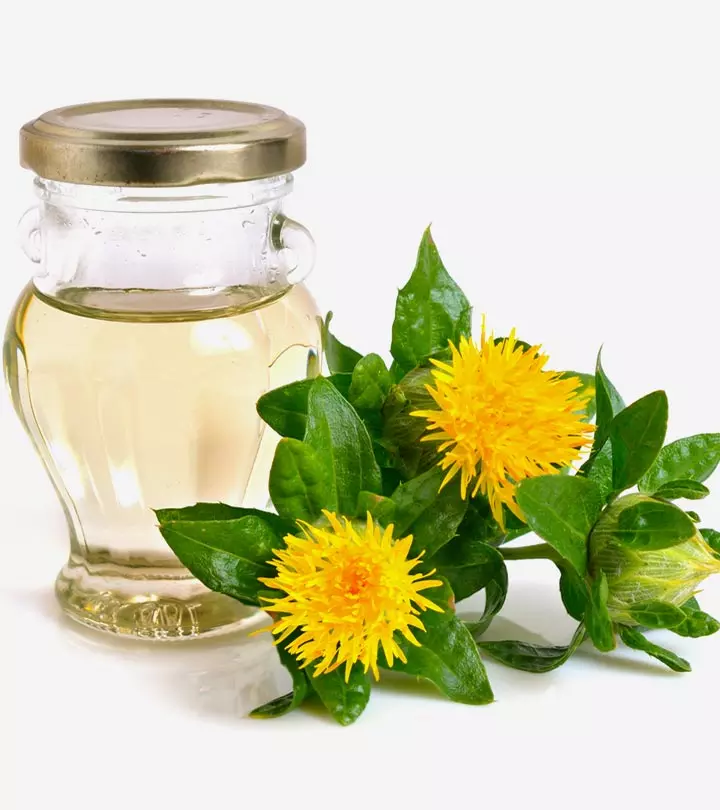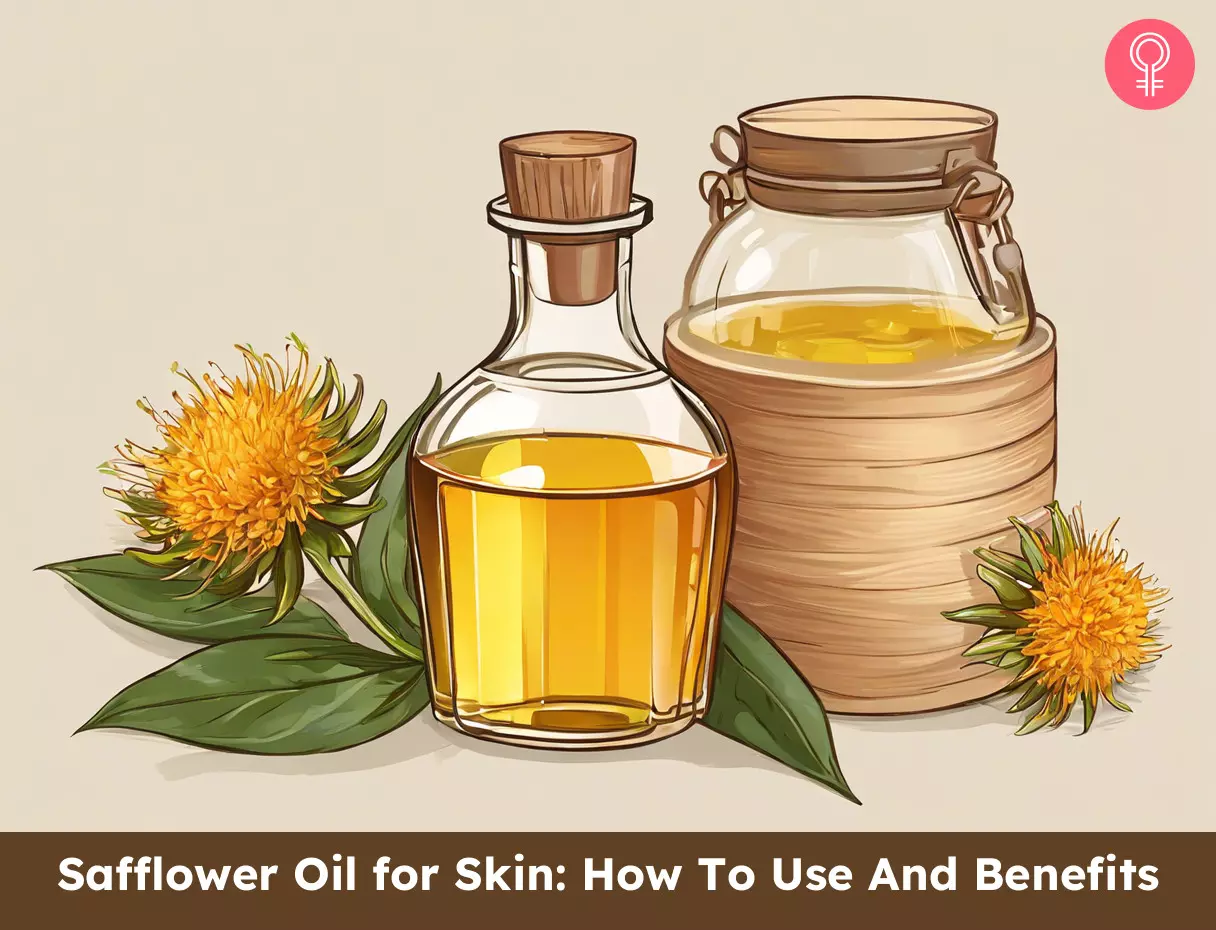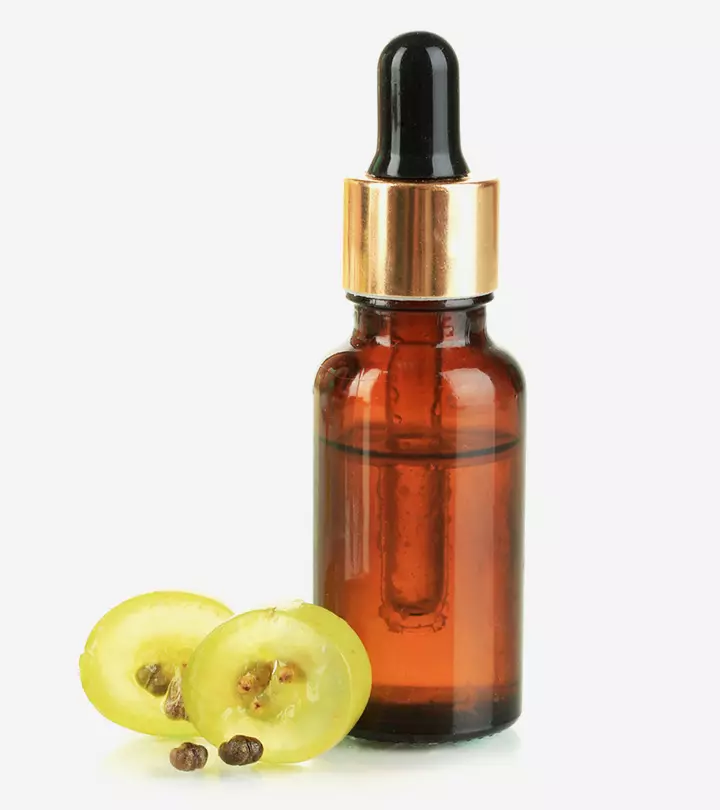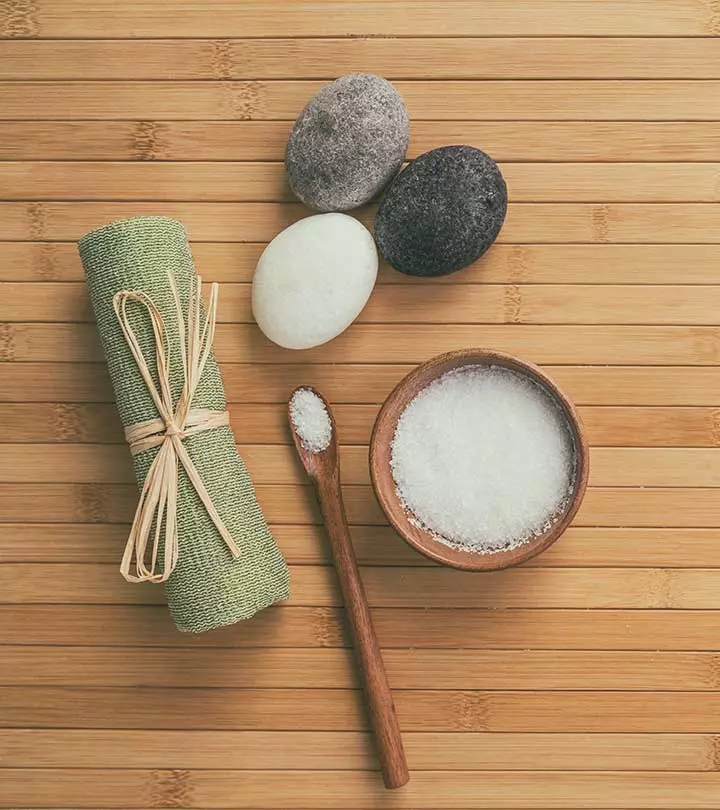Safflower Oil For Skin: Benefits, Usage, And Side Effects
Not just in your food, safflower oil is also good for your skin health.

Image: Shutterstock
Using safflower oil for the skin is not as common as it should be. This oil is extracted from safflower seeds and has emollient, antifungal, and antimicrobial properties. It helps enhance the appearance of the skin by keeping it smooth and hydrated. In this article, we will look at the skin care benefits of safflower oil, its types, how to use it, and potential side effects. Read on!
 Know Your Ingredient: Safflower Oil
Know Your Ingredient: Safflower OilWhat Is It?
A vegetable oil produced from the seeds of the Safflower plant (Carthamus tinctorius L.)
What Are Its Benefits?
It has anti-inflammatory and antimicrobial properties that can help with sebum production, skin texture, dark spots, and discoloration.
Who Can Use It?
It can be safely applied for moisturization, especially by people with sensitive skin.
How Often?
Products containing safflower oil can be used every day.
Caution
It may be mildly comedogenic, which can make some individuals allergic or sensitive to it.
In This Article
What Is Safflower Oil?
Safflower oil is extracted from the seeds of the safflower plant, Carthamus tinctorius. The plant is native to Egypt, East Asia, and the Western coasts of North America. Safflower oil is obtained by cold pressing or conventional solvent extraction methods. It is a well-known food oil due to its light taste. But its popularity in the skincare industry is on the rise.
Safflower oil has a rich linoleic acid content, making it good for the skin. Apart from that, it has many other benefits for the skin.
Key Takeaways
- Safflower oil, with its antimicrobial and antifungal properties, can prove beneficial for your skin.
- Rich in moisturizing fatty acids and important vitamins, it helps keep your skin nourished, smooth, and infection-free.
- While safflower oil may help deal with acne, eczema, psoriasis, and other skin conditions, it may irritate certain skin types.
Benefits Of Safflower Oil For Skin

- Treats Skin Disorders: Safflower oil is used to treat skin infections. It may also help reduce the risk of skin cancer (1). The oil may also help accelerate wound healing (2).
- Has Antimicrobial Properties: The oil has good antioxidant, antibacterial, antifungal, and antimicrobial properties (2). It fights yeast, fungi, and bacteria that hinder wound healing.
- Offers Nutritive Benefits: Safflower oil is often used in cosmetic products as an emollient (3). It is rich in oleic, linoleic, and omega-6 fatty acids (1). The high linoleic acid content improves skin appearance. It also keeps the skin from drying and flaking (3). Linoleic acid contains vitamins A, D, E, and K (3). Vitamin E helps improve skin health. Safflower oil helps treat essential fatty acid deficiencies and soothes irritated and abraded skin (3).
- Helps Inhibit Melanin: Safflower seeds contain serotonin derivatives and acacetin that inhibit melanin formation and help improve skin complexion (1). This suggests it may help lighten dark circles, dark spots, and other skin discolorations.
- Boosts Skin Hydration: Safflower oil moisturizes the skin and protects it. It boosts skin hydration and prevents water loss (4). The oil is also believed to regulate the skin barrier function.
- Soothes Skin: The oil has anti-inflammatory properties that may protect the skin (5). It is used in cosmetic formulations to manage acne (1).
- Has Antioxidant Properties: Safflower oil contains polyphenols, carotenoids, flavonoids, and chlorophylls that have high antioxidant properties (2). These antioxidant properties help fight oxidative damage and promote skin health. Research shows that creams containing safflower oil may prevent photodamage and reduce signs of skin aging (6).
- Reduces Inflammation: Safflower oil has anti-inflammatory and analgesic properties that help reduce inflammation. Applying safflower oil may help reduce pain and swelling, especially during the postoperative period. According to research conducted on rats, it was proved that a 300 mg/kg dose of safflower oil had similar pain relief effects to 10 mg/kg naproxen sodium in specific tests. It also helped reduce swelling in rats’ paws. This study suggests that safflower oil, especially at a specific dose, has potential as a natural pain reliever (7). Another study also confirms that the presence of vitamin E contributes to the anti-inflammatory activities of the oil (8).
These are the benefits safflower oil could have on your skin. That said, are you aware that safflower oil is available in two types?
Types Of Safflower Oil

- Regular Safflower oil: This natural oil is thick in consistency and odorless. It is extracted from safflower seeds and may be used for cooking and cosmetic and medicinal purposes. It is safe to be applied to the skin. Regular safflower oil can be further classified into two types distinguished by the content of their unsaturated fatty acids.
- Linoleic Safflower oil: This oil is rich in polyunsaturated fatty acids. It contains 68-79% of linoleic acid (3), (9). Due to its high content of linoleic acid, it is often used in skincare cosmetics too.
- Oleic Safflower oil: This oil is rich in monounsaturated fatty acidsi Healthy dietary fats that keep your skin hydrated and healthy and slow down the signs of skin aging. . It is predominantly used as an edible oil in the food industry due to its lower saturated fat content.
- Safflower Essential Oil: This oil is extracted from the petals of safflowers and pressed and distilled. It can be paired with other essential and carrier oils for enhanced skin care benefits. It cannot be ingested but only applied topically.
Here are some ways you can use safflower oil to benefit your skin.
How To Use Safflower Oil For Skin

1. Safflower Oil For Acne
Safflower oil has anti-inflammatory properties and is often used in the treatment of acne vulgaris and pimples.
The oil also enhances wound healing and helps heal acne lesionsi Areas of skin that are different in size or color from the surrounding skin due to damage or injury to the skin. or scars.
What You Need
- Honey, 1 to 2 tablespoons
- Oatmeal, 1 to 2 tablespoons
- Safflower oil, 1 to 2 tablespoons
Procedure
- Mix the honey, oatmeal, and safflower oil.
- Whisk the mixture thoroughly.
- Apply the mixture to your face and leave it on for about 15 minutes.
- Wet your face a little and start scrubbing gently to get rid of the mask.
- Clean your face with cold water and pat it dry.
- Follow with a moisturizer.
 Quick Tip
Quick Tip2. Safflower Oil For Eczema
Eczema is an itchy skin inflammatory condition. It makes the skin barrier dysfunctional.
According to the National Eczema Association, approximately 31.6 million individuals in the United States, accounting for 10.1% of the population, are affected by various forms of eczema. It is estimated that 1 in 10 people will develop this skin condition at some point in their lives, with the highest prevalence occurring during early childhood. Among adults with moderate to severe atopic dermatitis (AD), 60.5% reported experiencing severe or unbearable itch in the past two weeks. Additionally, 86% reported daily itching, while 63% reported itching for at least 12 hours each day.
Its best treatment options include emollients and topical anti-inflammatory products (9). Safflower oil is known to improve the protective skin barrier function. It also has anti-inflammatory properties and prevents the skin from drying and flaking.
What You Need
- Safflower oil, a few drops, or as needed
Note:
You can also pair safflower oil with essential oil.
Procedure
- Apply a little safflower oil to the affected area once or twice a day and let it get absorbed completely.
- You may also apply it before you go to bed and leave it on overnight.
3. Safflower Oil For Wrinkles
Safflower oil is known for improving skin texture and promoting skin cell renewal, thanks to its linoleic acid. Incorporating it into your beauty routine can help improve skin health and tone. The oil’s antioxidant properties help minimize the signs of aging, including wrinkles.
What You Need
- Safflower oil, a few drops, or as needed
Procedure
- Apply safflower oil to your face before you hit the bed every night. Wash it off the next morning.
- You can also mix it with other essential oils like lavender or tea tree. You may even use safflower oil as an alternative to moisturizer.
4. Safflower Oil For Dark Circles And Skin Lightening
Daily sun exposure, environmental damage, and other extrinsic factors constantly bombard the skin and affect its health. This damage appears as early signs of aging, dark circles, dark spots, discoloration, and photodamagei Changes in the skin like wrinkles and pigmentation that appear on the skin due to prolonged exposure to the UV rays of the sun. . Safflower oil can be used for melanin inhibition (1). It may help lighten the dark circles, dark spots, and other discolorations.
What You Need
- Safflower oil, a few drops
Procedure
- Gently apply a few drops of safflower oil around your eyes with your fingertips just before you sleep. The oil works as a great under-eye serum.
- Apply it all over your face and follow it up with your nighttime skincare routine to accelerate the skin-lightening process.
5. Safflower Oil For Enhanced Skin Moisture
The non-greasy texture of safflower oil makes it an excellent skin moisturizing agent. It is similar to a humectant and helps maintain your skin’s moisture balance.
What You Need
- Safflower oil, a few drops
Procedure
- If you use an oil-based face mask, you can replace that oil with safflower oil or add a few drops of safflower oil to the existing recipe.
- For everyday use, add 15 drops of safflower to a bottle. Combine it with another carrier oil (you can use sweet almond or grapeseed oils).
- Apply a small amount of the blend to your face twice a day. It protects your skin from the sun during the day and keeps it moisturized when left overnight.
 Quick Tip
Quick TipNote: You can also easily include safflower oil in your skin care routine by blending it with your moisturizer or applying it directly as a makeup remover. Its light texture absorbs quickly, making it suitable for both day and night use.
Can you apply safflower oil as often as you want? Or does it have any side effects?
Side Effects Of Safflower Oil

Safflower oil is used in many cosmetic products such as moisturizers and suntan lotions. It is generally considered to be safe and non-toxic. It is often used to treat abraded and irritated skin. However, a study conducted on animals showed that undiluted safflower oil may cause minimal skin irritation (3). Safflower oil also may be mildly comedogenici Any substance or product that may likely clog the pores on the skin and encourage the formation of blackheads. , which might irritate the skin. Therefore, a patch test should be done to check for any adverse or allergic reactions to the skin.
Safflower is often mistaken for sunflower due to the similar sounding names. However, did you know that the benefits of sunflower oil also share similarities with safflower oil? Let us learn more in the following section.
Sunflower Oil Vs. Safflower Oil For Skin

When it comes to skincare, sunflower oil is relatively similar to safflower oil. They both contain high amounts of linoleic acid. They are also known to improve skin barrier function and are great emollients that improve skin health.
However, safflower oil is not as well-known and researched as sunflower oil. It also has a lower content of saturated fat when compared to sunflower oil.
Infographic: 5 Ways To Use Safflower Oil For Enhanced Skin Care
Safflower oil may not be a trending skin care oil, but due to its various benefits, it is considered the best for providing a boost of hydration to the skin. It is a powerhouse of antioxidants, vitamin E, heart-healthy fats, and linoleic acid. Check out the infographic below to learn how to use safflower oil as a part of your skin care regimen.

Illustration: StyleCraze Design Team
Safflower oil has several skin benefits, which is why it is widely used in skin care products. However, this nourishing and lightweight oil is not as popular as other skin and body oils. You will love safflower oil if you have oily skin because it has a non-greasy texture and does not feel sticky. It helps to keep dry skin hydrated and moisturized. It can also be an excellent addition to your nighttime skin care routine as it promotes overall skin wellness. If you haven’t tried safflower oil yet, give it a go and see how your skin feels. However, make sure to get 100% pure and organic safflower oil.
Frequently Asked Questions
How does safflower oil compare to other oils for skin care?
Safflower oil is lightweight and non-greasy, making it great for oily and combination skin. Compared to heavier oils like coconut or olive oil, it absorbs quickly and does not clog pores.
What skin type is safflower oil good for?
Safflower oil is light and non-greasy, and it suits all skin types. You can use it even if you have sensitive skin.
Is safflower oil a moisturizer or a sealant?
Safflower oil is an excellent moisturizer that gets absorbed quickly into the skin.
Is safflower the same as saffron?
No, safflower and saffron are not the same. However, many people use safflower as an alternative to saffron.
What is the pH of safflower oil?
Safflower oil is acidic and has a pH of 5.5 once digested.
Illustration: Safflower Oil for Skin: How To Use And Benefits

Image: Stable Diffusion/StyleCraze Design Team
Unlock the natural potential of sunflower oil as a remedy for dry skin. Discover expert tips and techniques for nourishing and hydrating your skin using sunflower oil in this enlightening video below. So, go ahead and check it out now!
References
Articles on StyleCraze are backed by verified information from peer-reviewed and academic research papers, reputed organizations, research institutions, and medical associations to ensure accuracy and relevance. Read our editorial policy to learn more.
- A Comprehensive Characterisation of Safflower Oil For Its Potential Applications As a Bioactive Food Ingredient – A Review,
https://www.biosaline.org/sites/default/files/publicationsfile/nauman_iftikhar_farooq_et_al._2017-safflower_oil.pdf - Cellular and Molecular Mechanisms of Oxidative Stress in Wound Healing,
https://www.hindawi.com/journals/omcl/2020/4103418/ - Final Report on the Safety Assessment of Safflower Oil,
https://journals.sagepub.com/doi/pdf/10.3109/10915818509078690 - Safflower (Carthamus tinctorius) Forgotten Cosmetic Plant,
https://www.researchgate.net/publication/233808201_Safflower_Carthamus_tinctorius_-_forgotten_cosmetic_plant - Anti-Inflammatory and Skin Barrier Repair Effects of Topical Application of Some Plant Oils,
https://www.ncbi.nlm.nih.gov/pmc/articles/PMC5796020/ - Preparation, Evaluation, And Clinical Application Of Safflower Cream As Topical Nutritive Agent,
https://journals.innovareacademics.in/index.php/ajpcr/article/view/27431 - An Experimental Comparison of the Analgesic and Anti-Inflammatory Effects of Safflower Oil, Benzydamine HCl, and Naproxen Sodium
https://pubmed.ncbi.nlm.nih.gov/32216647/ - The Anti-Inflammatory Properties of Safflower Oil and Coconut Oil May be Mediated by Their Respective Concentrations of Vitamin E
https://www.sciencedirect.com/science/article/pii/S0735109707010509?via%3Dihub - Atopic Eczema,
https://pmc.ncbi.nlm.nih.gov/articles/PMC4773205/
Read full bio of Dr. Sonam Jeswani Ramrakhiani
Read full bio of Ramona Sinha
Read full bio of Anjali Sayee
Read full bio of Shiboli Chakraborti



























Community Experiences
Join the conversation and become a part of our empowering community! Share your stories, experiences, and insights to connect with other beauty, lifestyle, and health enthusiasts.